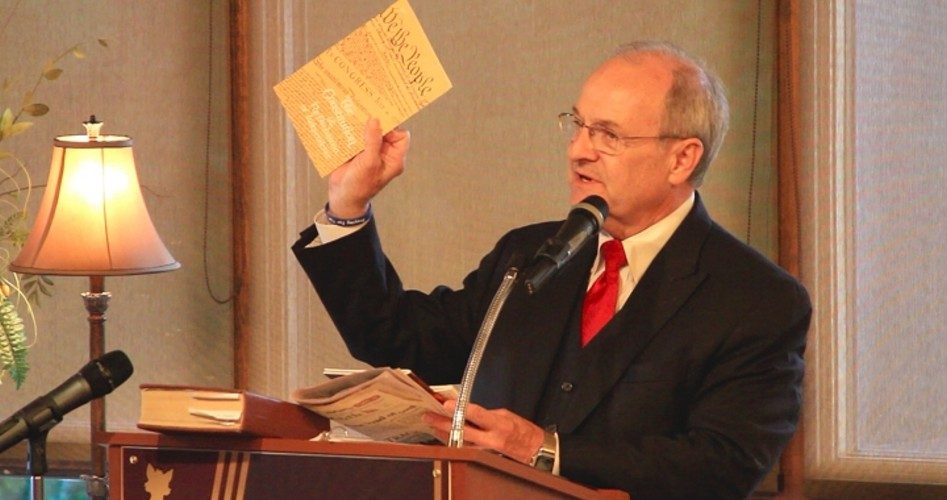
In a move observers and officials said was aimed at satisfying the “personal vendetta” of a citizen against Bowie County Judge Sterling Lacy, commissioners for the Northern Texas county voted three to two last week to ban the display of The New American magazine and other material deemed to have a “political point of view” from his office. However, in doing so, Judge Lacy, who presides over the county commission, said officials may have inadvertently opened up a “can of worms” that could lead to the prohibition of everything from the Constitution to the Bible. Activists even suggested the American flag could be prohibited under the ban.
The controversial vote was taken after county resident Emily Sabo officially complained. Apparently she is part of the establishment wing of the local GOP, parts of which hold a grudge against constitutionalist and Tea Party elements in the Republican Party, such as Judge Lacy. During a citizen comment section of a county commission meeting, Sabo claimed that Lacy’s display of The New American magazine, which she inaccurately described as “socialist,” was a violation of a county regulation. The rule prohibits the use of county property for displaying “campaign materials” and “any other political activity.”
“The county has an excellent policy in regards to campaign materials, but nothing I’ve displayed meets those criteria,” Judge Lacy told The New American in a phone interview after the vote. “I feel like this is overkill with a lot of unintended consequences. With all the serious business we have to do, the last thing we need is distractions like this.” The New American magazine is non-partisan, and county residents are being offered three free online (PDF) issues to help them decide what they think. The magazine does not, and has never, endorsed political candidates.
Still, County Commissioner Tom Whitten seized on Sabo’s citizen complaint and proposed that the county court (similar to the commission in other states) take action. During the session, Whitten read from the website of The John Birch Society, a constitutionalist organization in which Judge Lacy has been an active member for decades and which publishes the now-banned magazine in question. He also serves as a member of the society’s distinguished National Council.
“The mission of The John Birch Society is to bring about less government, more responsibility, and with God’s help, a better world by providing leadership, education, and organized volunteer action in accordance with moral and constitutional principles,” Whitten said, quoting from the site and the society’s mission statement. “The John Birch Society strives to educate the electorate on proper role of government and its civic responsibility in order to restore constitutional limited government.”
Citing the Internet, Whitten also noted that the JBS “supports anti-Communism, limited government, and a Constitutional Republic, and personal freedom.” According to the commissioner, both the county legal advisor and the district attorney said that the regulation banning campaign materials and political activities from the offices of elected officials would apply to The New American magazine and “possibly others.” “Whether you support this or whether you don’t is not at question here,” Whitten added after reading more about the views and efforts of the society.
Then it was time to take formal action. “Judge, I move to have the material that has been determined to be a violation of county policy, including but not limited to The New American magazine, be immediately and permanently removed from the county judge’s office,” Commissioner Whitten said. Another commissioner seconded the motion. Before the vote was taken, though, Commissioner Mike Carter chimed in with his thoughts on the potential implications of the ban.
“I think we are opening up a bigger can of worms just to satisfy the vendetta of one person against the county judge,” Carter explained. “I just don’t … I don’t say that we can police every pamphlet that comes into this county just because of the one that the judge has. We have got lots of other problems in this county right now, more than a pamphlet.” The audience applauded.
“Alright, who’s going to be the pamphlet policeman?” Carter continued, prompting laughing and giggles from the citizens in attendance. “Whose gonna decide which ones are and which ones aren’t, the sheriff?” The sheriff indicated that policing pamphlets would be the county commission’s responsibility, not his. “That’s y’all’s job,” he said after Judge Lacy asked whether his NRA magazines might be confiscated by the sheriff as well. Citizens laughed.
Just before the vote, Commissioner Whitten told the commissioners court that voting against the measure banning The New American and other materials from Judge Lacy’s office would put them “in direct contradiction of” the position taken by the district attorney and the county legal advisor. “Sheriff, you gonna send one of your deputies?” asked Lacy, smiling. The sheriff responded: “I don’t think that falls under the Penal Code in the State of Texas.” Citizens laughed, again. After some more back and forth about the NRA and the rules, commissioners voted in favor of the strict ban by a one-vote margin.
In an interview with The New American after the vote, Judge Lacy, a Republican who plans to run as an independent at the next election, laughed it all off. However, he also warned that a “can of worms” was being opened up. “They’re including in ‘political activity’ anything with a political point of view,” he explained, adding that the ban will presumably affect almost all of the literature he keeps in the waiting area of his office — NRA publications, Constitutions, county association magazines, and more. “All of these express a political point of view.”
“It’s being misused,” he said of the county regulation in question. “In banning The New American because it has a point of view, they said anything with a point of view is banned. By order of the court, I’m ordered not to have in my office any materials that express a political point of view. I have a Time magazine there, and that has a point of view. We’re trying to get them to see that under this interpretation, we can’t have the Bible, the Constitution, we can’t have anything in there on the table for people to read while waiting to see me.”
While Lacy had not yet cleared out his office’s waiting room by the time of the interview, he jokingly said he was thinking about simply putting everything out in the foyer, since the new interpretation of the ban applies only to his office. “We’re bound to have a lot of papers in our files that express a point of view, too,” he said. “We don’t know what the criteria are on the rest of the material in there.”
Ironically, the whole brouhaha has sparked a great deal of interest in The New American magazine among county residents. “My staff said people have been coming in looking for copies of The New American, so the only copies I had were gone pretty quickly,” he said, adding that more would be coming and that local media reports were still generating curiosity about the publication among those who were unfamiliar with it. “Out of my office, out in the foyer area, I’ll have samples of The New American.” The JBS said three free issues would be provided to citizens upon request.
Asked what visitors to his office might be able to read while waiting to speak with him, Lacy laughed, saying he was not sure. “In banning a magazine, they left open the possibility that even the Constitution and the Bible would be banned,” he explained. “One thing I’m thinking of doing is taking one of the daily papers, cutting out everything that has a political point of view, and putting it on display in the waiting area.” Again he laughed at the thought of it all.
As for the citizen with the personal vendetta, Lacy said it had to do with intra-GOP squabbling between constitutionalists and Tea Party-minded members against the “more-RINO-oriented” elements of the local Republican Party. When Lacy won his election, no Republican had ever been elected county judge, so parts of the establishment wing of the party were upset. “She was looking for something to criticize me for,” he said about the citizen who complained.
When reached by telephone, the resident who objected, Emily Sabo, screamed for almost two minutes, saying her number was on a no-call list and demanding that she never be called again. After explaining that it was The New American magazine calling to get her side of the story — not a telemarketer — she became even more furious. “I’m not talking to you or telling you anything!” she shouted. “And I’m not giving you any story!”
The news of the ban on literature with a political point of view also attracted the attention of Steve Oglesby, a Bowie County resident and the editor of Four States News, who quickly wrote an article about it for his readers. “What stands out about the whole kerfuffle is the amount of effort and coordination that went into something so petty,” Oglesby told The New American in an e-mail. “My immediate thought was that this was obviously meant either to distract Judge Lacy from more important issues, or to divert the public’s attention from other activities.”
The Bowie County Patriots said in an online post that “one of the things the Bowie County Commissioner’s Whitten, Stone and Blackburn banned from Bowie County property” was the Holy Bible. “Will the American flag be next? It does represent a point of view!”
Commissioner Whitten did not immediately return a phone call seeking comment.
Photo: Judge Sterling Lacy
If you would like to receive The New American’s daily highlights, please click here.
Alex Newman is a correspondent for The New American, covering economics, education, politics, and more. He can be reached at [email protected]. Follow him on Twitter @ALEXNEWMAN_JOU.



